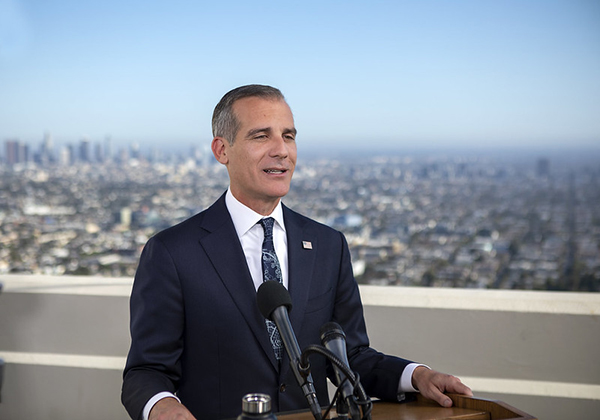Staff and Wire Report
LOS ANGELES — Los Angeles Mayor Eric Garcetti and a coalition of American mayors launched an initiative to work toward reparations for Black Americans in an effort to recompense for slavery and centuries of systemic oppression.
“We’ve never had a serious solutions-oriented conversation about restitution to enslaved people or to their descendants,” Garcetti said. “We’ve never adequately addressed the fact that in America the average Black family earning $100,000 a year lives in a neighborhood with an average income of $54,000 a year. Or that in my city, not just the 10 to one wealth gap but a nearly 100 to one wealth gap between white and Black families exists,” Garcetti said.
The mayors in the Mayors Organized for Reparations and Equity (MORE) coalition have committed to:
• Supporting HR 40 in the U.S. House of Representatives, which would establish the Commission to Study and Develop Reparation Proposals for African Americans.
• Forming advisory committees made up of local Black-led organizations in their cities to formally advise the mayors on an approach to reparations and identify funding sources.
• And establishing pilot reparation programs targeting a cohort of Black residents.
Garcetti added that cities do not have the funds to pay for reparations themselves and need the federal government’s support.
The Mayors Organized for Reparations and Equity coalition was co-founded by Garcetti and Austin, Texas Mayor Steve Adler, St. Paul, Minnesota Mayor Melvin Carter, Providence, Rhode Island Mayor Jorge Elorza, Kansas City, Missouri Mayor Quinton Lucas, Durham, North Carolina Mayor Steve Schewel, Sacramento Mayor Darrell Steinberg, Denver Mayor Michael Hancock, Asheville, North Carolina Mayor Esther Manheimer, St. Louis Mayor Tishaura Jones and Tullahassee, Oklahoma Mayor Keisha Currin.
Garcetti also announced the creation of the L.A. Reparations Advisory Commission — a blue-ribbon task force comprised of leading voices in activism, academia, law and racial justice — which will advise the city on a future reparations pilot program for a group of Black residents.
The advisory commission will be tasked with providing recommendations for the format, function and goals of a potential reparations pilot program in Los Angeles, including strategies and opportunities to seek public and/or private dollars to fund pilot programs.
The seven-member commission will identify an appropriate academic partner before beginning the formal process of developing and advocating for implementation of a pilot reparations program targeted at a cohort of Black residents.
The blue-ribbon commission’s members have been selected jointly by Mayor Garcetti and African-American members of the City Council.
They include: Michael A. Lawson, president and CEO of the Los Angeles Urban League, who served as a U.S. Ambassador in the Obama administration; Charisse Bremond-Weaver, who has led economic development, health and wellness and education initiatives benefiting families throughout South L.A; Mark Wilson, a longtime policy leader on education, job training, supportive housing and restorative justice; Khansa T. Jones-Muhammad, co-chair of the Los Angeles chapter of the National Assembly of American Slavery Descendants; Mandla Kayise, an educational equity expert and experienced community planner;
Katrina VanderWoude, president of Los Angeles Trade Technical College, an institution at which three-fourths of students are first-generation college students; and professor Cheryl Harris, who serves as the Rosalinde and Arthur Gilbert Foundation Chair in Civil Rights and Civil Liberties at the UCLA School of Law.
Garcetti appointed the first four members of the task force. The three Black members of the Los Angeles City Council, Marqueece Harris-Dawson, Curren Price and Mark Ridley-Thomas appointed Kayice, VanderWoude and Harris, respectively.
“This coalition will begin to reverse 250 years of slavery, 90 years of Jim Crow, 60 years of separate but equal, and over 35 years of racist housing policies,” Harris-Dawson said. “The families that I represent deserve more than the economic realities produced by this flawed system.
“Los Angeles continues to lead as one of the most progressive cities in America and has the opportunity to lead in these efforts to invest towards reckoning with our compounding moral debts.”
“The legacy of slavery continues to cloud society to this day, with the lingering effects of inequality felt by way of structural and economic racism throughout all facets of life for Black Americans,” Price added. “Reparations are an element of unfinished business to right the wrongs of the nation. … It is imperative that we boost opportunities and chart a clear and stable path for the Black community.”
“Equity matters and it is incumbent upon those of us who sit in positions of authority to work harder at dismantling systemic racial barriers within the entities for which we are responsible,” Ridley-Thomas said. “Reparation will not undo the decades of historic injustices, but we cannot move forward unless we are intentional about identifying solutions to advance racial equity.”











